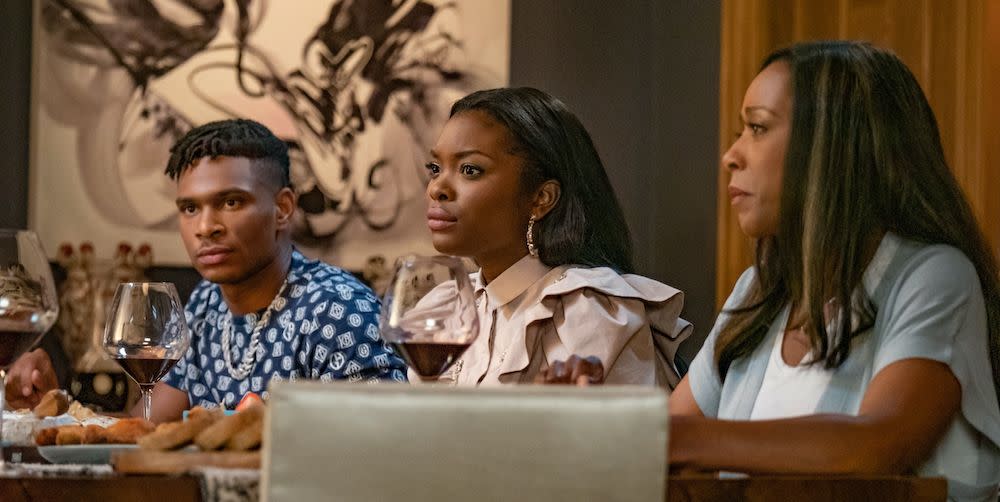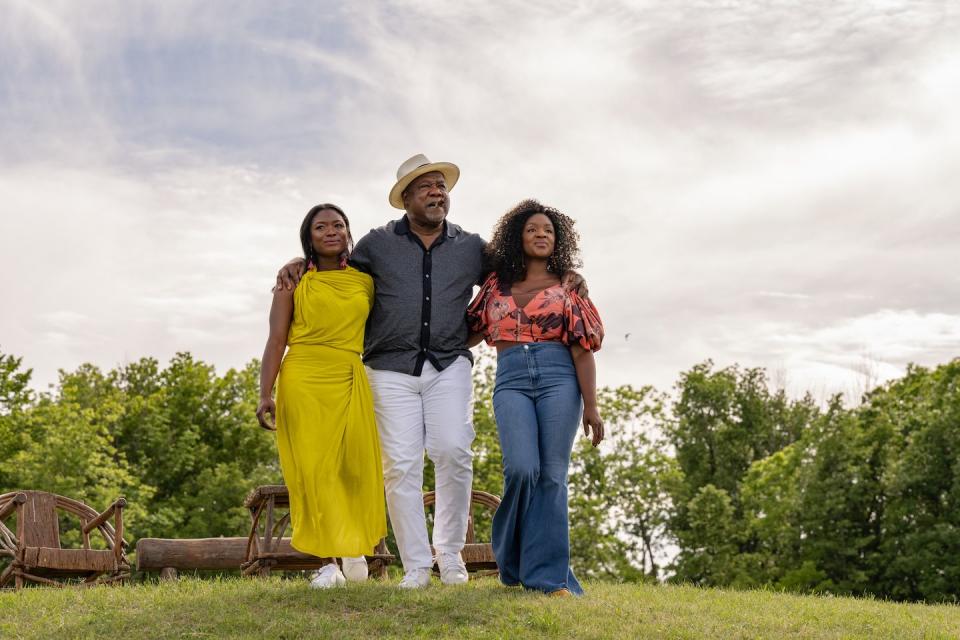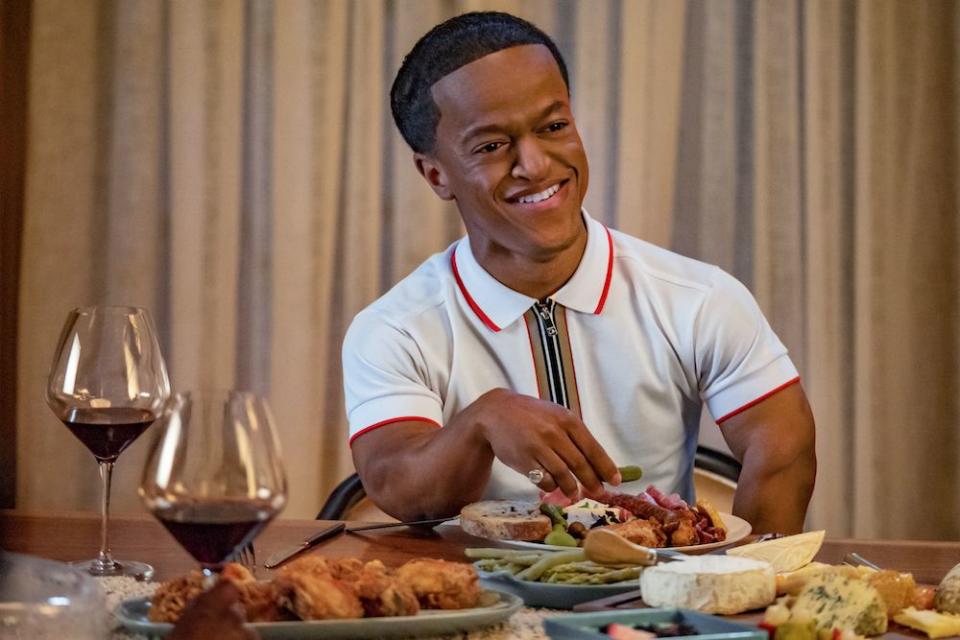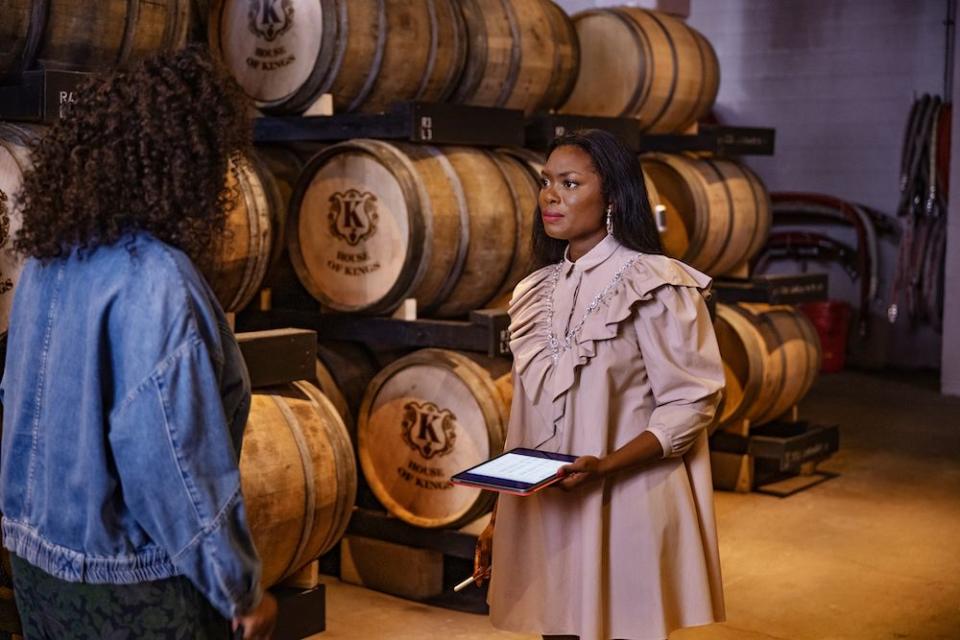Janine Sherman Barrois Shares the Surprising Inspiration Behind Her New OWN Show, “The Kings of Napa”

- Oops!Something went wrong.Please try again later.
- Oops!Something went wrong.Please try again later.
- Oops!Something went wrong.Please try again later.
"Hearst Magazines and Yahoo may earn commission or revenue on some items through the links below."
The Kings of Napa’s premiere doesn’t mess around. Fifteen minutes into the OWN drama’s first episode, which dropped January 11, comes a twist that changes the course of the characters' lives. As audiences on Twitter noted, the surprises just keep coming—let’s just say that sisters Vanessa and Melanie have a lot to work out.
And to think: The first inkling of this highly unpredictable drama came to creator Janine Sherman Barrois when she was at her most relaxed. Ten years ago, Barrois—who previously helmed the nail salon–set series Claws—took a trip to a vineyard in Santa Barbara with her husband and friends. Speaking to her mom on the phone, Barrois learned something that surprised her: Rideau Vineyard, where she was vacationing, is Black-owned. At first, Barrois argued: “I said, ‘Mom, it’s in Santa Barbara. It’s not Black-owned.’ She’s like, ‘Black people own vineyards, Janine.’”
Barrois says she was genuinely surprised. Until that conversation, she hadn’t encountered the idea of Black-owned vineyards in pop culture or even real life. Sitting on a picnic blanket later, sipping on wine, the potential for a TV show unspooled before her. “I thought, I can make a family drama that is about people I know, people I have seen at family reunions—but I’m just going to put them in this setting that nobody has seen us in before,” Barrois says.
Five years later, Barrois wrote a script for the show that would become The Kings of Napa.

The image of Barrois, surveying the vineyard and considering what she could make, resembles Reggie (Isiah Whitlock Jr.), the King family patriarch, in the opening scene of The Kings of Napa. Lounging in an Adirondack chair, Reggie—whose day job is a surgeon—contemplates all that he built after deciding to invest in a vineyard. As his sister Yvette (Heather Simms) says later, people, including others in the community, doubted him. “They were expecting him to rip out those vines and put in a liquor store,” she says.
For Barrois, the vineyard is important for what it represents: generational wealth. “That vineyard could have been stocks. It could have been buying a summer home. It could have been anything else, but this was a way for Black people to see generational wealth applied in a different way,” Barrois says.
Spoiler alert: You’ll encounter plot details from the first episode of The Kings of Napa below.
In the first season of The Kings of Napa, we see the King family reckon with the power vacuum left after Reggie’s death in the series premiere, as his children—August (Ebonée Noel), Dana (Rance Nix), Christian (Ashlee Brian), and Bridgette (Yaani King Mondschein)—fight for control of the family business. We spoke to Barrois about plot twists, making The Kings of Napa look “expensive,” and the potential for a season 2.
This is such a fantastic ensemble cast. As a writer, how did you balance all of their perspectives? Is there a character you were really rooting for?
As a creator, you want to create characters that can kind of triangulate and be at odds with each other. You want a character like August who’s vibrant and optimistic, you want her to butt heads with a character like Dana, who is in your face, always thinking about power, and is relentless. To make the triangle really work, you also want the other son that is trying to find his way: How do I shine in this family when everyone’s treating me like wallpaper because the focus is on August and Dana?
All the characters just came out of what didn’t I have, and what I needed. They’re all like my babies, though, so I don’t feel comfortable saying who I like the most.
“What I think is so relatable about the show is that it holds up a mirror to your own life. You can see the drama within your own family.”
How did you cast the roles of the King siblings?
I saw a short film that Rance Nix was in. When I saw him, I said, “Oh my goodness.” When the show was over, I told my husband, “I got to go upstairs. I got to rewrite this part for Rance Nix.” I thought Rance had such swagger. Such a confidence. He had heart, but he also had this imbued arrogance in him that I thought [Dana] had.

You hadn’t ever spoken to him!
No. The funny thing is, I then followed him on Instagram, and he remembers me eventually following him. And he was like, “What is this about?” Then I rewrote the part. With OWN, it took another couple of years of rewrites. Then I finally approached him. But I had him in my head the whole time. I actually went to the studio and said, “Should we do a holding deal on him? We need to lock him up.”
As for August—I had my mind on a lot of women, but I had been a big fan of Ebonée since FBI. I was very, very impressed with her. [Director] Matthew Cherry and I were watching audition tapes and were Zooming with actors. Ebonée did her audition on a cell phone. Matthew and I started texting back and forth—"Like, is she a star?" I responded, "She's a star."
Do you think the revelations would have come out about the King family regardless? Or did the catalyst in the premiere need to happen for them?
I think it had to happen. This pushes the family down a rabbit hole, and they keep going down further and further and further. You’ll ask yourself as the season goes on, Can they get out of the rabbit hole? When you think maybe they finally got out, they will be pushed back down again.
The magic source of the show is that, with every family dynamic, it doesn’t matter if you go to a funeral, a wedding, or a family reunion. If you talk enough to your family, you’ll find out drama about your family that they’ve been holding in, they’ve been letting fester. And eventually, it comes out. What I think is so relatable about the show is that it holds up a mirror to your own life. You can see the drama within your own family.
Because you’re stuck with your family. Things are going to happen.
That’s the thing. Most people, they don’t have to deal with you. People are either paid to deal with you or they’re your friends. So they’re your honest tribe. But your family actually has to be, like, in the front-row seat of your movie for the rest of your life. They have sort of no choice. Every time you want them to get out of the auditorium and leave you alone, they’re right back there. That’s the key to our family drama—and that’s what I’m really proud of with the show.
While I was watching, I was like, “This is like a soapier version of Succession!”
Exactly. It is, and we will take that compliment.
Did the cast drink wine on set?
No, but they did wine school while in quarantine in their hotel rooms, taught by a sommelier in Toronto. This helped them so that when they got to set, they knew what to do. We had a father and son from the Tilford Vineyard in Georgia as consultants. They read over the scripts and made sure the technical aspects felt real. Harvest season was correct!
In her eulogy, August talks about how her father spoke about the importance of rest. This is a show about work, so I was struck by that speech. What message were you trying to get across?
I follow [Tricia Hersey], who runs The Nap Ministry. She kind of talks about how people should rest—that Black people should rest. And I’ve read a lot of stuff about the notion of rest. You think for years, we’re kind of laborers and we are so accustomed to capitalism, to work, work, work. It really is important to show a generation of kids that in order to come up with your dreams, you have to relax, you have to rest, you have to walk in nature, you have to take a nap—because you need the opportunity to let your brain manifest something great.
“So often, stories are told through the lens of trauma as it relates to people of color. It’s really cool to see shows coming out of the lens of joy.”
You also helmed Self Made, about Madam C.J. Walker and the beauty empire she built in the 1900s. Do you see a connection between the two shows, and if so, what is the power of putting Black wealth on-screen?
Culture changes from the images audiences see. It’s time that Black people have an array of images. So often, stories are told through the lens of trauma as it relates to people of color. It’s really cool to see shows coming out of the lens of joy.
During the premiere, so many people [online] were saying, “Oh, there are so many great shows on tonight” [like Abbot Elementary, Black-ish, Grand Crew, Our Kind of People, and more]. I’m like, “This is the moment we’ve fought for.” We have fought for a moment where there’s a ton of television that shows people of color in great lives.
The show looks expensive—from the outfits to the art on the walls. How did you make sure the Kings’ lifestyle looked authentic?
It was important to me to show that the Kings lived a life of glamour. The Kings are selling a lifestyle: When you see them eating food, you want to eat the food as well. When they open a bottle of wine, you feel the urge to open a bottle of wine, too.
In 2020, we started looking at artists we could have on the show. My husband and I are really big art collectors. I started working with different galleries that I had relationships with to let us reproduce works and deal with licensing fees for the work of artists like Shinique Smith, Carrie Turner, and Ronald Jackson. There’s the copy of a piece in August’s entryway that just sold for $150,000.
The clothes were really important to the show. My costume designer, Michelle Lyte, is a genius. We wanted to make sure that when August entered frame, she looked like a fashionista, the way Carrie Bradshaw did on Sex and the City. We wanted that feeling of people asking, “What is she going to wear in the next scene?”

When you were watching people engage with the show on Twitter, did you feel like you had accomplished what you had set out to do? What will success look like in the context of this show?
I felt very engaged with the community and people responding; laughing, thinking, Oh, this is a lot. I was elated. I think for me, success was last night. But real success is continuing to be able to tell this story.
Do you have enough plot twists to keep them coming for another season?
I have enough plot to keep us going for 10 years. We can keep going.
And can the Kings keep up with those plot twists?
I think they can keep up. I think humanity is complicated, and these characters have enough to keep peeling back the different layers of them.
You Might Also Like

